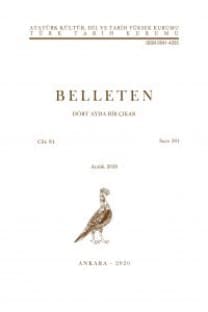Maarif Nazırı Haşim Paşa ile İlgili Orijinal Bir Belge ve Bazı Eğitimsel Görüşler, Sorunlar
Bu yazımızda Abdülhamit döneminin son Maarif Nazırı olan Haşim Paşanın (nazırlığı: 1903-1908) Saraya hitaben yazdığı ve Başbakanlık Devlet Arşivinde gördüğümüz bir belge tanıtılacak ve bu belgede yer alan bazı eğitim sorunlarına değinilecektir. Fakat önceden Haşim Paşa ile ilgili bazı bilgiler vermekte yarar vardır. Türk Eğitim Tarihinde Haşim Paşanın hiç adı geçmez. O, unutulmuş bir Maarif Nazırıdır. Günümüzde yalnızca, "şu mektepler olmasaydı maarifi ne güzel idare ederdim" biçiminde söylediği rivayet olunan söz bazen esprili biçimde zikredilmektedir. O dönemlere ilişkin taradığımız kaynaklarda onun adına rastlanıyor. Fakat kaynaklar ondan hep olumsuz biçimde söz ediyorlar. Belki o, başarılı olmak şöyle dursun, olumsuz görülen çalışma ve düşünceleri nedeniyledir ki Türk Eğitim Tarihinde hiç yer tutmamıştır.
Anahtar Kelimeler:
Haşim Paşa, II. Abdülhamid, Eğitim Sistemi, Maarif Nazırlığı, 1903-1908
A Proposal for Research on Indo - Turkish Relations
Interchange between India and Turkish world is older than Islam and there is little doubt that Indians and Turks during the Hittite period have several common religious concepts and even political contacts. It is generally believed that the first contact of the Turks took place with the compaigns of Mahmud Ghaznavi in India in the first decades of the II th. century A. D. but in fact India came into direct contact with the Turks through Turkish states first established on Indian soil in the first century B. C. long before the advent of Muslims in India. This was the first phase of Indo-Turkish relations which ended with the fail of the Turk Shahi dynasty. Later on in the second century of Christian era a famous Turk ruler emerged in India and made his way to the glory and renown. He is known as Kanishka (120-162 A. D.). Warahmehra, in his well-known Sanskrit work of Rajtrangi, describes the emperor Kanishka and his successors as belonging to Turushka family. The details of description of this emperor available to us, positively point to the fact that Kanishka belonged to Turkish race and not to Mongols. His coins bears the title of "Shaunanushah" which is a Turkish word.
Keywords:
Indo-Turkish, India, Turkey, Kanishka, Sanskrit,
- ISSN: 0041-4255
- Yayın Aralığı: Yılda 3 Sayı
- Başlangıç: 1937
- Yayıncı: Türk Tarih Kurumu
Sayıdaki Diğer Makaleler
Maarif Nazırı Haşim Paşa ile İlgili Orijinal Bir Belge ve Bazı Eğitimsel Görüşler, Sorunlar
Türk Tarih Kurumu'nun 50. Kuruluş Yıldönümü
Türk Tarih Kurumu'nun Genel Kurul Toplantısı
Kurtuluş Savaşı Günlerinde İngilizlerin Eline Geçen Türkiye Büyük Millet Meclisi Gizli Tutanakları
